Explore the critical distinctions between Go and Rust in our latest 2024 guide, and learn which programming language is the best fit for your project's needs.
More...
Two popular programming languages that have been gaining traction and popularity among developers: Go and Rust
As a tech enthusiast, you want to stay up to date on the latest trends and decide which language is the best for your specific needs. Go vs Rust are both excellent choices with their unique advantages and disadvantages. Whether you are focused on performance, efficiency, or ease of use, this article will provide you with the necessary insights to make an informed decision.
Key Takeaways
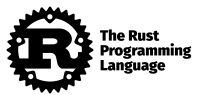
Before we jump into the comparison, let's take a moment to introduce the two programming languages we'll be discussing: Go and Rust.
Go, also known as Golang, is an open-source programming language developed by Google in 2009. It focuses on simplicity, reliability, and efficiency and has gained popularity for its built-in concurrency support and fast compilation times.
Rust, on the other hand, is a relatively new systems programming language developed by Mozilla in 2010. It prioritizes safety, concurrency, and speed while providing low-level control over system resources. Rust's memory safety guarantees and support for zero-cost abstractions make it a popular choice for systems-level programming and performance-critical applications.
Both Go and Rust have unique features and strengths that make them suitable for different use cases and programming paradigms. In the following sections, we'll explore the syntax, performance, concurrency, ecosystem, and industry adoption of these two languages to help you determine which one is best suited for your project needs.
Go Vs Rust's Syntax and Language Features
Understanding the syntax and language features of programming languages is crucial for building efficient and reliable software. In this section, we will compare the syntax and language features of Go and Rust.
Similarities
Both Go and Rust have a clean and straightforward syntax that is easy to read and write. They both support various data types, including integer, float, string, and boolean, and have similar control structures such as loops and conditional statements. Additionally, both languages support functions, structs, and interfaces, which are essential for building complex software systems.
Differences:
Language Features | Go | Rust |
|---|---|---|
Pointers | Uses pointers extensively | Uses ownership and borrowing instead of pointers |
Error Handling | Uses multiple return values for error handling | Uses Result and Option enums for error handling |
Concurrency | Has built-in support for concurrency with goroutines and channels | Uses async/await and threads for concurrency |
Memory Management | Has garbage collection for automatic memory management | Uses ownership and borrowing for manual memory management |
Module System | Uses a simple import statement for modules | Uses a more complex module system with features such as crates and modules |
Go Code Examples:
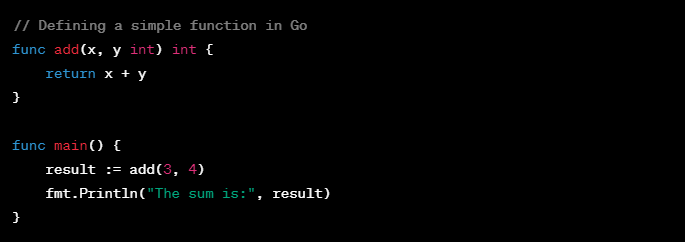
Rust Code Examples:
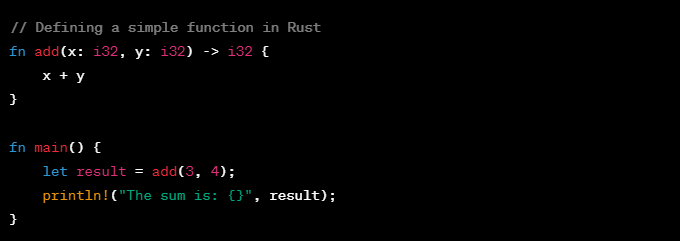
As shown in the table, Go and Rust have some notable differences in their language features. Go uses pointers extensively, which can be challenging for beginners but allows for more control and efficiency in memory management. On the other hand, Rust uses ownership and borrowing to avoid common bugs such as null pointer exceptions, making it a safer language. Rust also has a more complex module system than Go, which can be overwhelming for some developers.
Concurrency and Parallelism in the battle of Go vs Rust
Concurrency and parallelism are critical factors in modern software development, especially for applications that require high-performance and responsiveness. Both Go and Rust have built-in mechanisms to facilitate concurrent and parallel programming, but they differ in their approaches and implementation.
Concurrency in Go and Rust
In Go, concurrency is achieved through goroutines, lightweight threads that execute functions concurrently. Goroutines can be created easily using the "go" keyword, and they communicate with each other through channels, which act as synchronized buffers for data transfer. This model allows for efficient and safe communication between goroutines, enabling developers to write concurrent programs with ease.
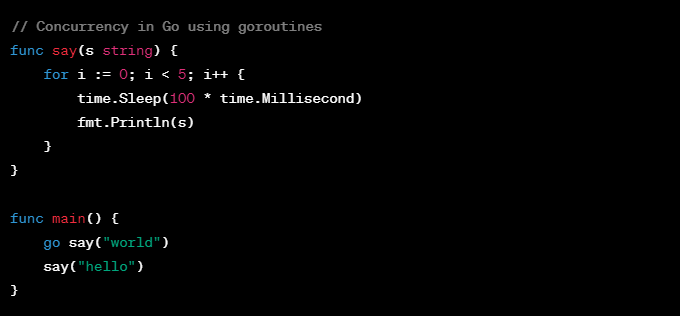
Rust, on the other hand, uses the async/await model for concurrency, which allows functions to be suspended and resumed non-destructively. This enables Rust to achieve high levels of concurrency without the overheads of threading. Additionally, Rust's ownership and borrowing system ensures thread safety and prevents data races.
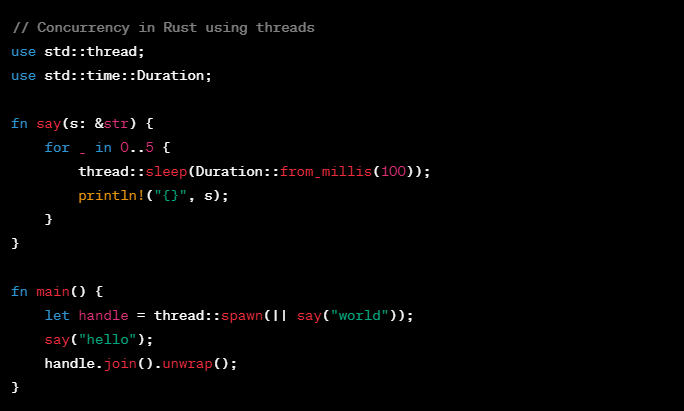
Parallelism in Go vs Rust
Parallelism involves executing multiple tasks simultaneously across multiple processors or cores. In Go, parallelism is achieved through a concurrent model where goroutines are executed in parallel across multiple processors, utilizing all available processing power. The Go runtime automatically schedules goroutines on multiple cores, making it easy to write parallel programs without worrying about the underlying hardware.
Rust has a similar approach to parallelism, although it uses threads instead of goroutines. Rust's "std::thread" module allows developers to create OS-level threads to execute code in parallel. Additionally, Rust's ownership and borrowing system ensures thread safety and prevents data races, allowing developers to write safe and efficient parallel programs.
Concurrency | Parallelism | |
|---|---|---|
Go | Uses goroutines and channels | Uses concurrent model with automatic scheduling |
Rust | Uses async/await model | Uses threads with ownership and borrowing system |
Performance and Efficiency: Comparing Go vs Rust
Performance and efficiency are paramount concerns for developers when choosing a programming language. In this section, we'll compare Go and Rust's performance and efficiency metrics, including compilation speed, execution speed, and memory management. By examining their benchmarks, we can determine which language is better suited for specific use cases.
Compilation Speed
Go prioritizes fast compilation times, making it an appealing choice for developers working on large codebases. In contrast, Rust's compilation process is comparatively slower, but it provides a range of optimization options that can significantly improve the code's speed and efficiency.
Execution Speed
When it comes to execution speed, Rust generally outperforms Go. Rust's focus on memory safety and the absence of a garbage collector enables it to execute code faster with less memory overhead. While Go's performance is respectable, it can't match Rust's speed in certain tasks.
Memory Management
Rust uses a unique ownership and borrowing model to manage memory while ensuring memory safety. This approach allows Rust to eliminate runtime overhead, resulting in better performance. In contrast, Go uses garbage collection to manage memory, which can contribute to higher memory consumption and slower performance.
Compilation Speed | Execution Speed | Memory Management | |
|---|---|---|---|
Go | Fast | Good | Garbage collection can lead to higher memory usage |
Rust | Slower | Excellent | Unique ownership and borrowing model for efficient memory management |
Go examples:

Rust examples:

Go vs Rust's Ecosystem and Community Support
When considering a programming language, one should pay attention to its ecosystem and community support. The ecosystem comprises the tools, libraries, frameworks, and development environments that make it easier to build software. Community support refers to the availability of resources and forums where developers can seek assistance, share knowledge, and connect with other like-minded individuals.
Ecosystem Comparison
Go has a well-developed ecosystem, with a wide range of tools and packages available for developers. Some of the popular packages in Go include:
Package Name | Description |
|---|---|
A package that provides HTTP client and server implementations | |
A package that provides a SQLite3 driver for Go's database/sql package | |
A package that provides a web framework for Go, used for building RESTful APIs |
Rust, on the other hand, has a smaller ecosystem due to its newer status as a programming language. However, it has been rapidly growing and gaining significant traction in recent years. Some popular Rust packages include:
Package Name | Description |
|---|---|
A package that provides a data serialization and deserialization framework | |
A package that provides a runtime for writing asynchronous I/O and networking code | |
A package that provides a powerful web framework for Rust, with a focus on performance and ergonomics |
Community Support Comparison
Both Go and Rust communities are active and supportive, offering a variety of resources for developers of all levels to learn and grow.
The Go community is well-established, with official documentation, mailing lists, and a dedicated forum. Go also has a growing community of developers on Github, with over 95,000 contributors to date.
The Rust community is also active, with official documentation, a forum, and a community-driven wiki. Rust has a friendly and welcoming community, with a focus on helping newcomers get up to speed quickly. Rust has over 40,000 contributors on Github, with a rapidly growing user base.
Thus, both languages have strong and supportive communities that offer a wealth of resources for new and experienced developers.
Use Cases and Industry Adoption
Although Go and Rust have different design philosophies, they are versatile programming languages that are used in various domains. In this section, we will highlight the common use cases and industries where each language excels.
Go
Go's design emphasizes simplicity, productivity, and concurrency. As a result, it is commonly used in building large-scale networked software systems, web applications, and distributed systems. Some of the popular use cases of Go include:
- 1Building web servers, proxies, and load balancers due to its efficient handling of network I/O and concurrency features.
- 2Developing microservices and cloud-native applications as Go's lightweight binaries and low memory footprint make it easy to deploy, manage, and scale.
- 3Writing command-line tools and system utilities as Go's standard library includes various packages for file handling, networking, compression, and more.
Go has gained popularity among organizations like Uber, Dropbox, SoundCloud, and Docker, who have adopted it for their backend infrastructure and services.
Rust
Rust's design emphasizes safety, performance, and memory management. As a result, it is commonly used in building systems software, operating systems, game engines, and high-performance applications. Some of the popular use cases of Rust include:
- 1Writing low-level code, such as device drivers and kernel modules, as Rust's syntax and safety features prevent common bugs and errors that can cause system crashes or security vulnerabilities.
- 2Developing high-performance applications, such as web browsers and video games, as Rust's multithreading and memory management features allow for efficient use of system resources.
- 3Building blockchain and cryptocurrency software, as Rust's security features and performance make it an attractive language for these applications.
Rust has gained popularity among companies such as Mozilla, Microsoft, Dropbox, and Cloudflare, who have adopted it for their products and services.
What's the outcome of Go vs Rust?
When deciding between Go vs Rust, it's essential to consider your project requirements, your experience level, and your team's skills. If you're building a network application, a microservice, or a distributed system, Go is a good choice. If you're developing a high-performance system or an application that requires memory safety, Rust is the way to go.
